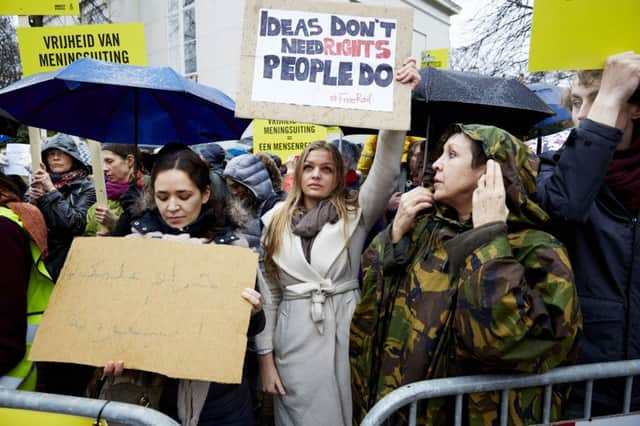Saudis delay public flogging of blogger


The activist, who founded the now-banned online forum Liberal Saudi Network, was due to receive 50 lashes in public after Friday prayers.
He was sentenced to ten years in prison and 1,000 lashes for “insulting Islam” and disobedience last May.
Advertisement
Hide AdAdvertisement
Hide AdBadawi received the first round of lashes last Friday, prompting an international outcry. The Gulf kingdom offered no response to the worldwide condemnation and protests over the flogging.
Saudi Arabia is yet to comment on the health of Badawi or the postponement of his punishment.
Badawi, a father of three, is the co-founder of the Liberal Saudi Network, which published articles critical of senior Saudi religious figures and others from Muslim history.
Human rights organisation Amnesty International said in a statement that Badawi was examined by a doctor who felt his wounds had not yet healed and that he would not be able to stand another flogging.
The doctor recommended the punishment be postponed until next week, Amnesty added.
The United Nations’ top human rights official this week appealed to Saudi Arabia’s King Abdullah to pardon Badawi.
The UN high commissioner for human rights, Zeid Raad al-Hussein, said on Thursday that flogging was “at the very least, a form of cruel and inhuman punishment” prohibited under international law.
He appealed to the king to halt the public flogging by pardoning Badawi “and to urgently review this type of extraordinarily harsh penalty”.
Amnesty has launched a global campaign to free Badawi.
Advertisement
Hide AdAdvertisement
Hide AdIn 2008, he founded the Liberal Saudi Network to promote online debate on religion and politics in Saudi Arabia. In 2012, he was charged with insulting Islam and disobedience.
He was then sentenced to seven years in prison and 600 lashes. Last May, this was increased to ten years in prison and 1,000 lashes.
Badawi’s supporters accused Saudi Arabia of hypocrisy after officials attended a solidarity march in Paris last week.
The march honoured the victims of the Charlie Hebdo attack, which prompted global debate about the importance of free speech.
Those campaigning for Badawi’s release pointed out that Saudi Arabia was denying the blogger the right of free expression.
In addition to his sentence, Mr Badawi was also ordered to pay a fine of one million riyals (£175,000).
A friend of Badawi said he was “being used as an example for others to see”.
Saudi Arabia does not tolerate political dissent. It has some of the highest social media usage rates in the Middle East, and has cracked down on domestic online criticism, imposing harsh punishments.
Advertisement
Hide AdAdvertisement
Hide AdJudges are trained as religious scholars and have broad scope to base verdicts and sentences on their view of religious texts.
The country follows the rigid Wahhabi school of Islam, which demands harsh punishments for offences that are perceived as insulting or degrading to their Sunni beliefs.
Said Boumedouha, of Amnesty, said: “The flogging of Raif Badawi is a vicious act of cruelty prohibited under international law. By ignoring international calls to cancel the flogging, Saudi Arabia’s authorities have demonstrated an abhorrent disregard for the most basic human rights principles.”
A US State Department spokesman said Saudi Arabia should review the case and “cancel this brutal punishment”.